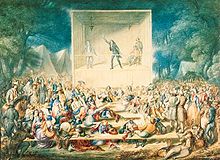


Analtar call is a tradition in some Christian churches in which those who wish to make a new spiritual commitment to Jesus Christ are invited to come forward publicly. It is so named because the supplicants gather at the altar located at the front of the church building. Most altar calls occur at the end of an evangelical address.[1]
Altar calls are a recent historic phenomenon beginning in the 1830s in America. During these, people approached the chancel rails, anxious seat, or mourner's bench to pray.[2] One of the most famous 19th century revivalists, Charles Grandison Finney, "popularized the idea of the 'altar call' in order to sign up his converts for the abolition movement".[3] In many Churches of the Wesleyan-Arminian theology, the altar call, in addition to being an invitation for people to experience the New Birth, is also often used to implore believers to experience the second work of grace, known as entire sanctification.[4] Notable examples in history of using altar calls include Billy Sunday and D. L. Moody.[2]
Rick Warren notes that the Bible does not refer to any similar practice.[5] Some in the Reformed Churches object to the use of the altar call for a variety of reasons. It is argued that the practice is intimidating and therefore creates an unnecessary and artificial barrier to those who would become Christians but are then unwilling to make an immediate public profession under the gaze of an assembly.[5] Others object in that they may mislead people into confusing outward conduct with spiritual change. In doing so, they argue, altar calls may actually give people false assurance about their salvation.[6] In addition, Carey Hardy argues that they change "the essence of the gospel", create believers with false professions of faith, and do not "follow the biblical method for public identification".[7]
I want to remind you that Jesus never said you had to walk from Point A to Point B in a church to become a believer. In fact they gave no come forward, down the aisle altar calls for the first three hundred years of the church because they didn't even have church buildings for the first three hundred years of the church, so there obviously weren't any aisles to walk down. The come forward invitation is a method that's only about 180 years old. It was invented by Methodist churches in the late 17th century and later picked up and popularized by Charles Finney in the mid-1800s—and the majority of evangelical churches use that form today. There's nothing wrong with it. It's just not necessarily a biblical commandment. It just happens to be a method that was used frequently for the last 200 years.